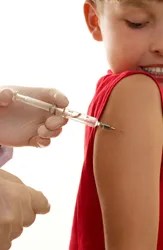Experts offer tips for parents on vaccines and other health prerequisites required by children’s camps. Get in the know before your kids go this summer.
 Though the snowstorm that buried parts of the East Coast in mid-February has not yet melted from our memories, it is time to begin thinking about summer camp. While you and your child research sites, fill out applications, and check off supply lists, remember to find out which vaccinations and medical examinations are required by the camp you choose.
Though the snowstorm that buried parts of the East Coast in mid-February has not yet melted from our memories, it is time to begin thinking about summer camp. While you and your child research sites, fill out applications, and check off supply lists, remember to find out which vaccinations and medical examinations are required by the camp you choose.
The extent to which parents have to worry about vaccines and physicals for their camp-bound children will depend on several variables, explains Sean Nienow of the National Camp Association and Barb Levison of Tips for Trips and Camps. These variables include the camp’s international connections and the child’s anticipated length of stay.
Camps that regularly welcome children from foreign countries often take particular care that all of its campers are up-to-date on their vaccines. “A lot of diseases that essentially don’t exist in the U.S. do exist abroad,” Nienow points out. Similarly cautious are the camps that provide children with opportunities for overseas travel. Depending on the countries to be visited, campers who go abroad “may need to have additional vaccines recommended by the program or their doctor,” says Levison.
In other situations, vaccinations may not be an “absolute requirement,” Nienow says, especially the H1N1 vaccine, which is not part of the normal vaccination schedule and may not have been available to every child. Still, camps are likely to be vigilant during the intake process, when campers will be checked for signs of illness, especially fever. If a child does exhibit symptoms, the camp may briefly keep her in the infirmary to see if she feels better, or it may send her home until she has been symptom-free for a few days.
Physical examinations are most likely to be required when a child expects to have an extended stay at camp. A camper leaving home for one week is less likely to be asked for proof of a physical than one who will be at camp for eight weeks, Nienow explains. Most camps, however, will at least require a completed health questionnaire from each camper. Parents should read these questionnaires thoroughly as soon as they arrive so that doctors’ appointments can be scheduled as soon as possible. “Pediatricians’ offices get inundated with requests for camp physicals and the filling out of forms in May and June,” Levinson warns, and Nienow reminds parents to allow plenty of time in case a follow-up to the first physical is needed.
Even parents whose children are returning to a familiar camp should contact the director to see if any requirements have changed from last year. Likewise, parents who believe their children are up-to-date on their vaccines should double-check. It’s easy to lose track, Nienow says, especially when parents have more than one child.
In the end, everyone wants a happy and healthy summer. “Regardless [of a certain camp’s policies],” Nienow advises, “it’s just a good idea to get kids checked out” before they leave for camp “so everyone can feel more comfortable.”
For more information visit www.tipsontripsandcamps.com and www.summercamp.org.
Marian Tascio Friedrichs is a freelance writer who lives in Yonkers, NY with her husband and son.


















